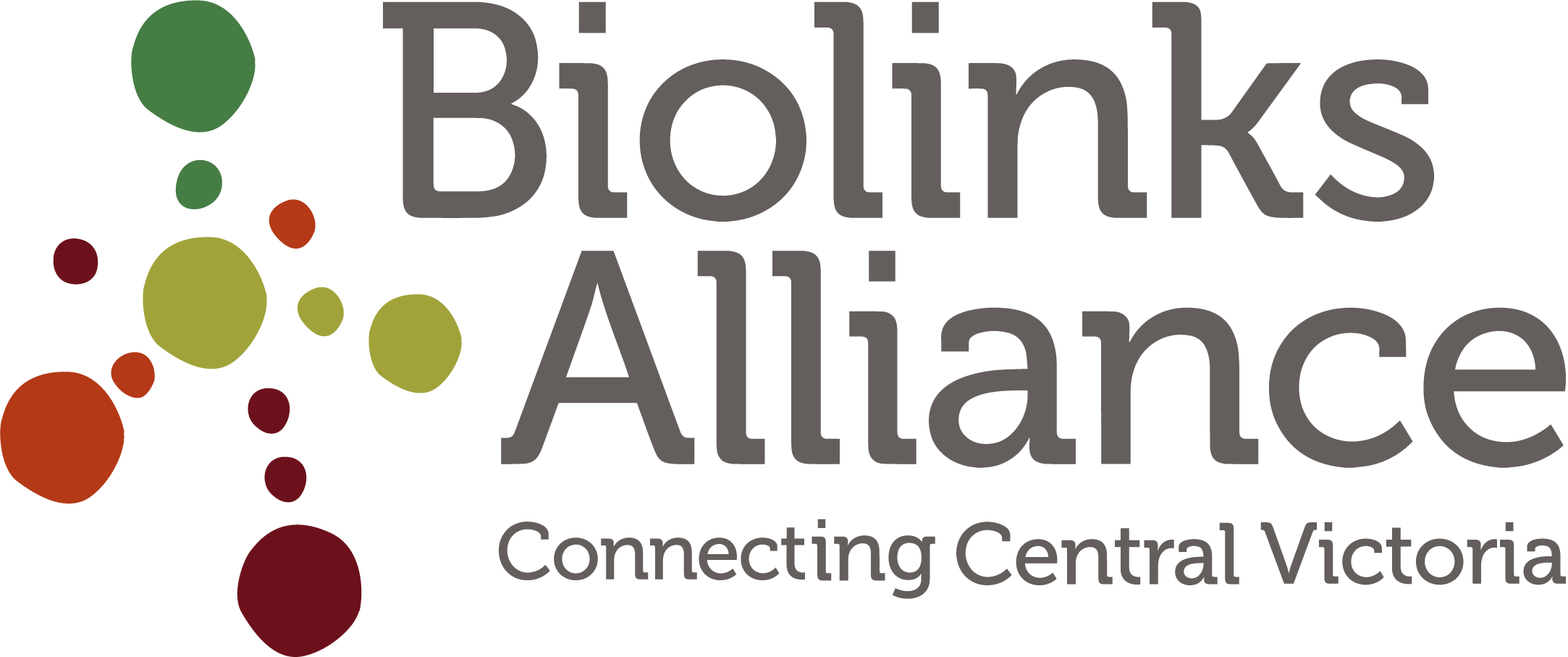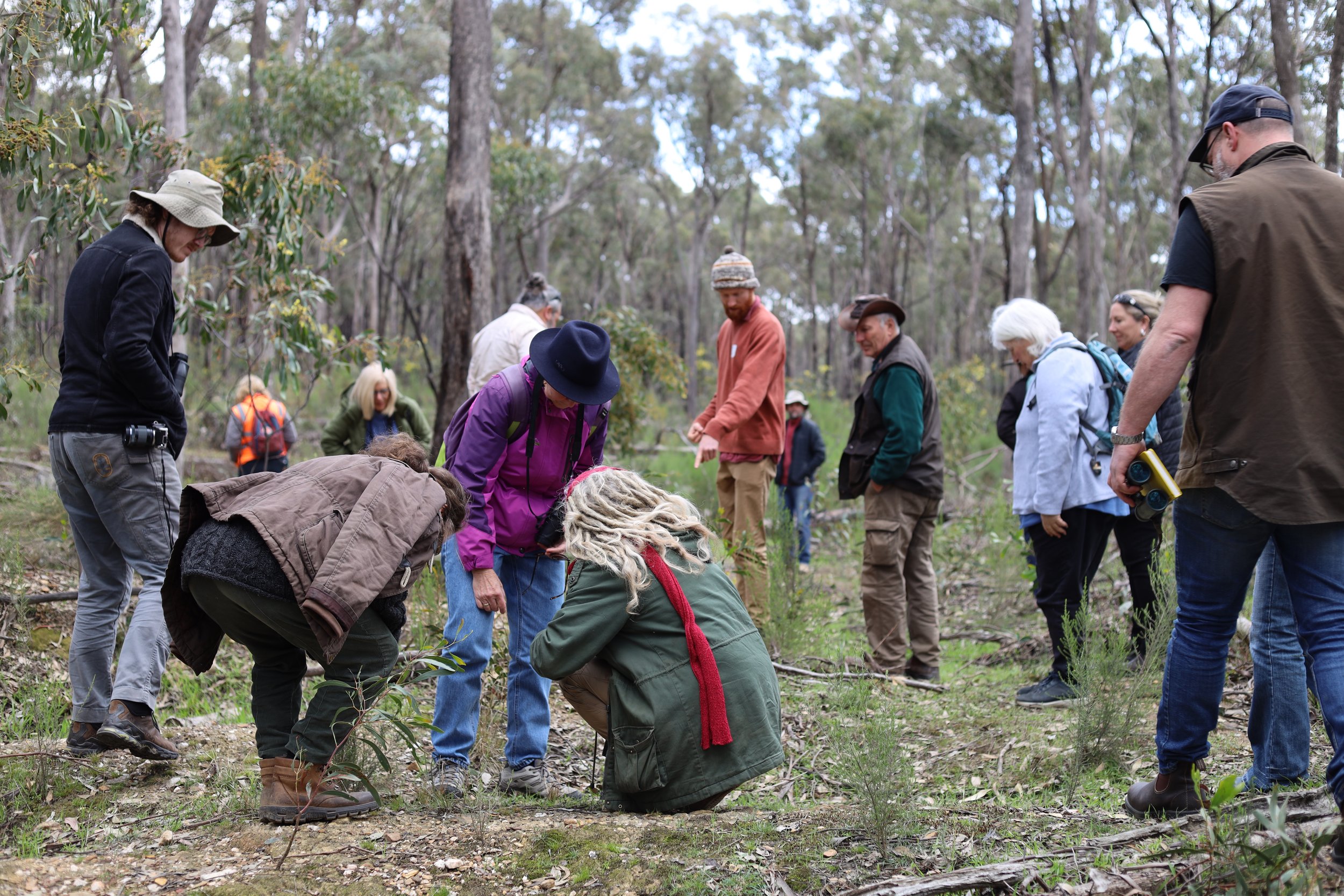Rewilding Central Victoria Symposium
Catalysing the practical delivery of rewilding and scaling-up urgent action in our region and beyond
‘Rewilding’ is embraced worldwide as an approach that goes beyond saving single species or patches of remaining habitat, to restoring the wider natural processes, and missing species, that support life.
Rewilding is propelling nature repair around the world but isn’t used widely in Victoria. Biolinks Alliance's Rewilding Central Victoria Symposium is set to catalyse the practical delivery of rewilding, scaling-up urgent action in our region and beyond.
Bringing together internationally recognised researchers from leading institutions (like the University of Melbourne), experts in their fields, and restoration practitioners working on exemplar projects (like Marna Banggara and Mt Rothwell Sanctuary), this Symposium includes:
Friday 13th September
- 13 presentations at La Trobe University, Bendigo (9.00am to 4.30pm)
- Symposium networking drinks, dinner and keynote speaker at the All Seasons Hotel, Bendigo (5.30pm to 9pm)
Saturday 14th September
- Rewilding project site visits to our Spring Plains Pilot Project and the Korong Ridge Conservation Estate (8.30am to 4pm)
Photo credit for Eastern Barred Bandicoot (in banner at top): ©Dave Watts
“There are many different ideas around what rewilding is and is not - this symposium is a starting point for us to get to the bottom of what it is in our Central Victorian context and inspire the work that will get us there.”
Rewilding Symposium Presentations
Derek Sandow
Derek Sandow is the Marna Banggara Project Manager at the Northern and Yorke Landscape Board. Derek has over 15 years’ experience helping to deliver biodiversity and conservation outcomes across an array of iconic Australian landscapes from the Ningaloo Coast to the Grampians. He will be discussing challenges and achievements of the ambitious rewilding project, Marna Banggara, which aims for broadscale introduced predator control, the reintroduction of locally extinct and functionally important native fauna, the reinvigoration of lost ecological processes, all within a productive working landscape.
Watch Marna Banggara "Rewilding the Southern Yorke Peninsula" below
Dr Noushka Reiter
Noushka Reiter’s research focuses on improving the conservation and translocation of threatened species by unravelling their unique associations with mycorrhizal fungi, pollinators and habitat. Noushka leads RBGV’s Orchid Conservation Program and the Preventing extinction of Victoria’s threatened flora program. Noushka was the winner of the 2023 Eureka Prize for Excellence in Botanical Science (see 2023 Australian Museum Eureka Prize winners).
Noushka Reiter’s presentation will be made available to watch online soon.
Amos Atkinson
Amos lives on Bangarang/Yorta Yorta lands, and is a proud Way Wurru, Bangarang, Dja Dja Wurrung, Barrapa Barrapa, Wemba Wemba, Daug Wurrung, Ngura-iliam Wirring, Wiradjuri man. He is a cultural fire practitioner who has learnt from Aboriginal people all over Australia and has brought this knowledge back to Victoria to help heal and care for Country. Amos is also passionate about sharing knowledge, and is involved with various research projects on Country, has his own cultural heritage education business, Wannyarra Woka, and is undertaking a PhD at RMIT focusing on how culture can heal First Nation people.
Amos Atkinson’s presentation will be made available to watch online soon.
Professor Nick Williams
Nick Williams is a Professor of Urban Ecology and Urban Horticulture at the University of Melbourne. He has a passion for restoring biodiversity through greater use of indigenous plants in all aspects of the urban landscape. This is reflected in his research developing and evaluating practical ways to do this in streetscapes, parks and on buildings, through his leadership of Friends of Merri Creek, and the rambunctious green roofs built outside his office window and on the family home.
Watch "Keys to the Biodiverse City" below
Dr. Peter Contos
Dr. Peter Contos works on rewilding projects that focus on the under-loved species - invertebrates and microbes. He uses manipulative experiments to understand: 1) how we can reintroduce these species onto farms, and 2) how rewilding mammals influences invertebrate and microbial communities. Peter will be describing a rewilding project in the Strathbogie ranges that reintroduced entire communities of invertebrates and microbes onto farmland using soil and litter transplants from remnant bush.
Watch "Rewilding invertebrates and microbes for improved biodiversity and ecosystem function" below
Dr Damian Jones
With a degree in Electronics Engineering and a PhD in Computer Vision, Damian worked as an engineer in several roles for a long time. He had a mid-life awakening and reinvented himself, changing careers to conservation. He completed a diploma in conservation and environment and is in the last semester of a degree in conservation and environmental science. Damian has worked with Odonata for 2 years at Mt Rothwell Sanctuary and at other sanctuaries in Victoria's Western District. These sanctuaries provide safe haven for the recovery of Australia's most endangered species including the Southern Brush Tail Rock Wallaby, Eastern Quoll, and Eastern Barred Bandicoot.
Watch "Mt Rothwell Sanctuary - a safe haven for threatened species" and "Panel discussion - The varied roles of predators in rewilding" below
Dr Bronwyn Hradsky
Dr Bronwyn Hradsky is a Research Fellow with the Quantitative and Applied Ecology group at the University of Melbourne. She uses a broad set of field, quantitative and simulation modelling skills to improve the integrated management of invasive predators and fire - two key threats to Australia's native fauna. Bron will be speaking on the panel about the roles of predators in rewilding.
Watch "Panel discussion - The varied roles of predators in rewilding" below
Kelly Ann Blake
Kelly Ann Blake is a proud Wadawurrung woman, living on Djaara Country. She graduated from La Trobe University with a Masters of Professional Archaeology in December 2023. Kelly’s research topic was ‘Reawakening the Traditional Cultural Knowledge of Dingoes in South Eastern Australia’ and she will share these perspectives with us as part of our panel discussion on the role of predators in rewilding our landscape. Kelly currently works as Biodiversity Project Officer at Wadawurrung Traditional Owners Aboriginal Corporation.
Watch "Panel discussion - The varied roles of predators in rewilding" below
Dr Paul Foreman
Paul Foreman is a highly regarded and skilled landscape ecologist, field botanist and researcher with over 30 years of experience in natural land management, holistic landscape ecology, biodiversity conservation and restoration across a range of sectors throughout Victoria and Australia.
Paul’s key expertise lies in interpreting landscape processes from first principles to identify useful insights like proofing ecosystem types, understanding current state and dynamics, vegetation function, mapping ecosystems services and options for restoration/monitoring. Paul was instrumental in getting the Spring Plains project off the ground and is passionate about advocating for landscape scale restoration to help address crises like climate change, species extinction and desertification.
Watch "Restoring function to degraded Box-Ironbark Forests - Spring Plains Watershed Repair Project" below
Daniel Young
Daniel is an applied restoration ecologist with a degree in Biological Sciences from La Trobe University. Daniel has been working in the conservation and land management sector for over 15 years, initially undertaking hands-on land management before transitioning into consulting and subsequently establishing Tailored Restoration Ecology and Conservation (TREC) Land Services in 2017. Daniel was heavily involved in the tree thinning component of the Spring Plains Watershed Repair Project, and will be discussing some of the operational elements to consider when undertaking works of this nature.
Watch "Restoring function to degraded Box-Ironbark Forests - Spring Plains Watershed Repair Project" below
Tricia Stewart
Tricia Stewart started her career in the conservation field twenty years ago, having obtained a Bachelor of Science degree with a dual major in Botany and Conservation Ecology. Tricia has worked at Royal Botanic Gardens Victoria for the past eight years as the Team Leader of Natural Areas, where she coordinates the integrated management strategies of the 340 hectares of remnant Cranbourne Bushland
In that time Tricia has enthusiastically confronted the challenges of wildlife trying to navigate a human modified landscape, by investigating, designing, implementing, and monitoring novel solutions to urban ecology problems, with particular focus on the challenges of wildlife interfacing with linear transport infrastructure, such as road ways.
Watch "How did the Bandicoot cross the road? A case study in effective road ecology solutions" below
Dr Cassia Read
Dr Cassia Read is an ecologist, educator and garden designer, working at the intersection of biodiversity conservation and human wellbeing. She is Principal Ecologist and Co-Founder of the Castlemaine Institute. Wilderhoods has been developed with her colleague and fellow ecologist, Ada Nano.
Watch "Wilderhoods: rewilding urban neighbourhoods" below
Dr Doug Robinson
Dr Doug Robinson is a zoologist and conservation scientist who leads Trust for Nature’s science program. For the past 30 years, he has worked primarily in agricultural landscapes as a conservation biologist, extension officer and conservation planner, garnering experience at the interface of research, policy and program delivery. He and his family manage a rural property in northeast Victoria protected under a conservation covenant.
Watch “Rewilding Victoria at a landscape and local scale – a Trust for Nature perspective” below
Dr Peter Rose
Dr Peter Rose is an aquatic ecologist with over 20 years’ experience within the government, university, and private sectors. Peter works at North Central Catchment Management Authority as the Project Manager for the Native Fish Recovery Plan – Gunbower and Lower Loddon; and is the Recovery Reach Coordinator for the Mid-Murray Floodplain Recovery Reach. Peter manages large-scale restoration native fish projects including fishway design and construction, instream woody habitat reinstatement, riparian protection and enhancement, wetland rehabilitation, and floodplain-specialist fish conservation projects.
Peter will present on rewilding threatened small-bodied floodplain specialist fish throughout central Victoria and the Murray River corridor.
Watch "Rewilding our waterways: native fish reintroductions in Central Victoria" below
Dr Duncan Sutherland (he/him)
Dr Duncan Sutherland (he/him) is a Senior Scientist at the Phillip Island Nature Parks, a Research Fellow at the University of Melbourne and Chair of the Eastern Barred Bandicoot National Recovery Team. His research focuses on restoring island ecosystem functions, managing pest animals, conserving seabird populations, and protecting threatened species.
Duncan will talk about the journey to recover the mainland Eastern Barred Bandicoot, their importance in the ecosystem, and the future of the species beyond safe havens.
Watch "Recovering Eastern Barred Bandicoots: past, present and future" below
Lance Lloyd, B.Sc., M.Sc.
Principal Ecologist, Lloyd Environmental P/L
Restoration Scientist (Aquatic Ecology), Winton Wetlands Committee of Mgt
Lance Lloyd has 40 years practical experience across SE Australia, and the Pacific Islands, in freshwater, estuarine, coastal and inland environments in ecology and management requirements. Native fish ecology and water management are his passions and he has published widely in ecology, flows, and habitat assessment in scientific papers and management reports. Lance led the Lake Mokoan Restoration Project from 1992 until 1998 where environmental water management principles and water regime management has been applied to affect the restoration of the lake’s water quality and ecosystem function. Lance has been central to the aquatic restoration science at Winton Wetlands for a decade which has resulted in better water quality and improved biodiversity. Lance led the work which resulting in Winton Wetlands becoming a Wetland of Distinction in 2020, the first site outside the USA.
Watch "The Time is Now: Rewilding aquatic species to improve biodiversity and ecosystem function" below
Symposium Site Visits
Day 2 of our Symposium offered the fascinating opportunity to visit two projects that are looking to restore ecological function - our very own Spring Plains Watershed Repair Pilot Project and Korong Ridge Conservation Estate.
Images from the Spring Plains Watershed Repair Pilot Project site visit - Day 2 of our Symposium
Images from Korong Ridge Conservation Reserve site visit - Day 2 of our Symposium
More rewilding resources
Rewilding Central Victoria - Panel Event - May 2023
Hosted by Biolinks Alliance, this fascinating and thought provoking expert panel discussion looked at whether the topical conservation approach, ‘rewilding’, can solve wide-spread environmental challenges in Central Victoria.








































